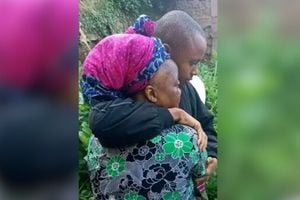
From left: Billy Mwangi, Ronny Kiplangat, Peter Muteti and Bernard Kavuli.
Sometime in September, 2022, then acting Inspector-General of Police Noor Gabow summoned Mohammed Amin to Jogoo House.
At that time, Mr Amin was the Director of Police at the Internal Affairs Unit in Upper Hill. After hours of discussion, Mr Amin was handed the task of leading investigations into the mysterious disappearance of two Indian nationals and their taxi driver.
The two Indians had arrived in the country in April 2022, four months before the August General Election. The men identified as Mohammed Zaid Sami Kidwai and Zulfiqra Ahmed Khan were IT experts who had come into the country to join then Deputy President William Ruto’s campaign team.
On July 23, the two and their Kenyan taxi driver Nichodemus Mwania went missing in mysterious circumstances.
At the time, there were fears that the three could have been abducted by security agents.
As soon as Dr Ruto was sworn into office as President, he embarked on pressing for investigations into the whereabouts of the missing men. And that is where Mr Amin came in.
Mr Amin took over the investigations from Lang’ata DCI officers, who had been handling the missing persons reports.
In less than one week, he and his team uncovered evidence that showed that the two Indians and their driver were abducted by an elite squad of security officers in a well-planned operation sanctioned by senior State operatives in the DCI and National Intelligence Service.
He made an oral presentation to Dr Ruto and top brass of the National Police Service, describing CCTV footage and other evidence that gave insights into the last moments of the missing individuals.
Their abduction was allegedly carried out by the DCI’s Special Service Unit (SSU).
At least 28 DCI officers from the SSU were investigated for the disappearance of the three men in what emerged as a case of extrajudicial killings.
President Ruto would then speak of the incident in his Mashujaa Day speech in 2022, saying security agents who used “terrible tactics” in the name of keeping the country safe would be dealt with.
“I have directed that immediate measures be undertaken to disband the Special Services Unit in the DCI and with urgency investigations must commence so that those found culpable are held accountable,” he announced.
It is on the basis of this report by the former Internal Affairs Unit boss that the decision to disband the SSU was made.
Mr Amin’s investigation led to the prosecution of 15 SSU officers who are now in court over the murders. The investigation is thought to also helped earn Mr Amin a promotion to head the DCI.
Two years after Mr Amin managed to unravel this abduction and subsequent murder of the three men, he is faced with another test of unravelling the abduction of youths perceived to be critical of the Ruto administration.
Only this time, after more than six months since a spike in enforced disappearances, with at least six young Kenyans abducted in December alone, the DCI boss and his team have nothing to show in terms of investigations.
Five of the six young men were released on Monday in a seemingly coordinated manner across the country.
The youth all have one thing in common — they have created or posted images and text critical of President Ruto’s administration on social media.
Weeks after Inspector-General of Police Douglas Kanja released a statement saying his officers had nothing to do with the abductions—and promising to investigate—questions linger on the squads operating with impunity and with the capacity to track their targets with precision.
Director of Public Prosecutions Renson Ingonga gave the police and the Independent Policing Oversight Authority three days to provide a report on investigations over the abductions. The deadline ended on January 1, 2025. No update has been made to the public to date.
Even after the denials, why has there been no progress reported on investigations or any arrests? Are the police admitting they are unable or unwilling to protect Kenyans and stop a dangerous gang that tracks and abducts young people at will without any consequences?
On Monday, hours after news of the release of four abducted young men broke, the police released a statement through spokesperson Resila Onyango.
In the statement, police said that investigations are ongoing, and mentioned news that had already broken early in the day, to the effect that Billy Mwangi, Peter Muteti, Bernard Kavuli and Rony Kiplangat had been released by their abductors.
“Notably, the Directorate of Criminal Investigations is investigating all cases of missing persons in the country, with most of the cases before court and others under active investigations,” the statement reads.
News of Gideon Kibet alias Kibet Bull being released came later. Steve Mbisi was still missing at the time of going to press.
As police scramble to assure the public, one key question remains unanswered: who is abducting, holding and releasing these young Kenyans without being detected?
Despite the police claim that investigations have landed some abductors in court, there has been no prosecution of any individuals suspected to have abducted young men and women critical of the government on social media.
Since June, 2024 President Ruto, his administration and the police have been trying to fight off the stink of possible State-sponsored abductions.
Speaking during a funeral ceremony in Bungoma on Saturday, President Ruto directed that the police bring to an end the wave of abductions.
“The police must do what they have to do. The IG of Police, Deputy IG of Police Mr (Gilbert) Masengeli who is here, and the Director of Public Prosecutions Mr (Renson) Ingonga who is also here, know what to do. They run independent institutions but we will support them to make sure that Kenya continues to be a country under the rule of law,” he said. “I took a firm decision when I took over; I said that we must stop extra-judicial killings in Kenya.”
This directive by the President does not seem to have had much impact as far as investigations into the abductions are concerned.
Just two weeks earlier, the President’s allies, National Assembly Majority Leader Kimani Ichung’wah and his minority counterpart Junet Mohamed asked the DCI to arrest social media users whom they felt posted offending images of the President.
A senior officer familiar with the state of affairs in the DCI yesterday told the Nation that the police were yet to make any headway with the investigations.
Mr Kavuli, a content creator who was abducted in Ngong on December 22, was found in Kitale town, over 388 kilometres from his residence. Neither he nor his family resides or comes from Kitale.
Mr Muteti, abducted from Uthiru on December 21, was found in the Nairobi city centre, more than 17 kilometres from his home.
Mr Kiplangat was found in Machakos, more than 79 kilometres from Kikuyu, where he lives and which was his point of abduction.
His brother Kibet said he was released by his abductors in Vihiga County; he was abducted in Nairobi.
Mr Mwangi walked to his parents’ home in Embu County. He was abducted on December 22 within the same county.
All the released abductees were disoriented, hungry, fatigued and unwilling to immediately speak to the press or the public on their encounter.
Manyatta MP Gitonga Mukunji alleged yesterday that Mr Mwangi was kept in a dark room, physically assaulted and denied adequate food as part of the torture.
The Nation reached out to Kiambu police boss Michael Muchiri over the investigations into the disappearance of Mr Muteti who was picked in Uthiru.
In a text message, he referred us to Dr Anyango, who did not respond to both text messages and calls to her phone.










